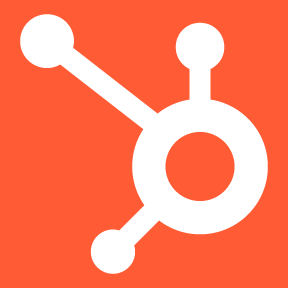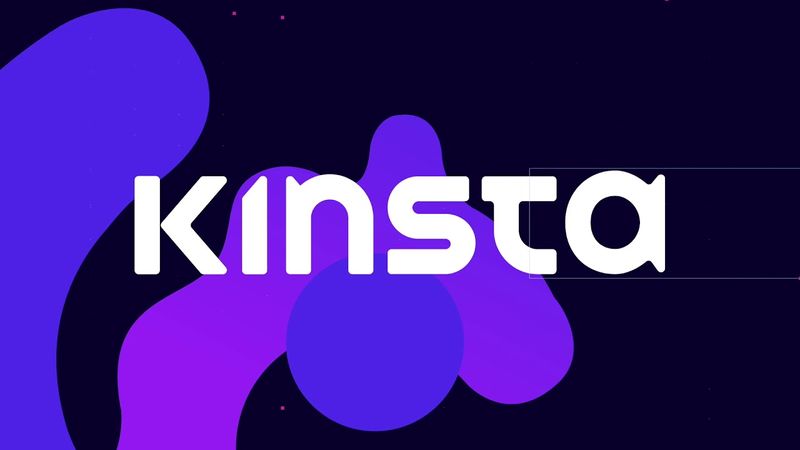At DataDab, we are obsessed with growth; we live and breathe account-based marketing. We've helped dozens of clients boost revenue by focusing their efforts on targeted high-value accounts.
But we often get asked by leads - what's the best ABM software to execute an account-based strategy?
It's a great question. The ABM technology landscape has exploded with slick new solution providers making big promises to revolutionize your go-to-market.
As account-based evangelists with over 10 years experience running ABM programs, my team reviewed and test drove over a dozen major ABM platforms this past year to uncover the solutions that deliver real results.
In this comprehensive guide, we'll share our insider perspective on the key players shaping the market in 2024. Learn what smart SaaS brands are using to get an unfair advantage executing precise, highly personalized account-based strategies to close more enterprise deals!
What is Account-Based Marketing (ABM)?
Before diving into the tools, let's quickly define what account-based marketing entails:
ABM is a strategic approach that focuses your marketing efforts on targeted accounts rather than leads. The goal is to personalize messaging and campaigns tailored specifically to key accounts in order to increase engagement, accelerate sales cycles, and grow revenue.
| Traditional Marketing | Account-Based Marketing |
| Lead-based | Account-based |
| Broad, high-volume outreach | Personalized, customized campaigns |
| Generic messaging | Tailored messaging per account |
| Slower sales cycles | Faster sales cycles |
As opposed to casting a wide net to generate leads, ABM concentrates budget and resources on qualified accounts with a higher likelihood to buy. This targeted approach delivers higher conversion rates and shorter sales cycles.
To execute ABM effectively, businesses need to arm themselves with the right software and tools. Here's an overview of the top ABM platforms on the market to consider in 2024.

Best ABM Software Platforms for 2024
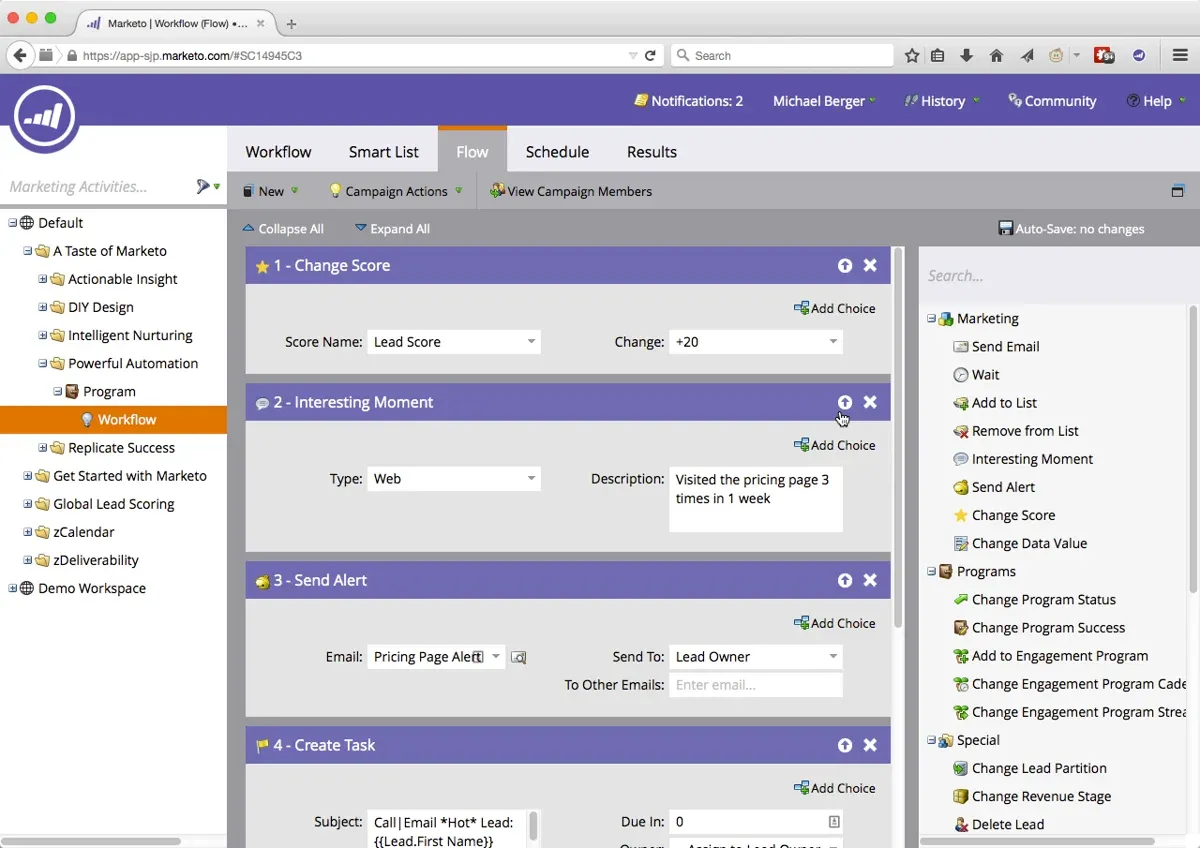
Marketo
Part of Adobe's marketing cloud suite after being acquired in 2018, Marketo remains the undisputed leader in marketing automation. Although not purpose-built for ABM, Marketo offers robust capabilities to power targeted account-based programs.
Key Features
- Integration with Adobe Analytics for deep account insights
- Account scoring to identify and tier key accounts
- Personalized landing pages and messaging at the account level
- Custom fields to track ABM metrics and KPIs
- Salesforce sync for tight alignment between sales and marketing
Ideal For
Enterprise businesses looking for a full-featured marketing automation platform with ABM functionality baked in.
What Users Love
Marketo strikes the right balance between ease of use and advanced functionality for sophisticated marketers. Users particularly praise Marketo's Salesforce integration for enabling seamless collaboration between sales and marketing teams.
Potential Drawbacks
As a complex platform built primarily for marketing automation, Marketo has a steep learning curve. It may prove overly complex for businesses just getting started with ABM.
Pricing
Marketo pricing starts at $1,195/month for the basic Professional Edition. Enterprise plans are custom quoted.
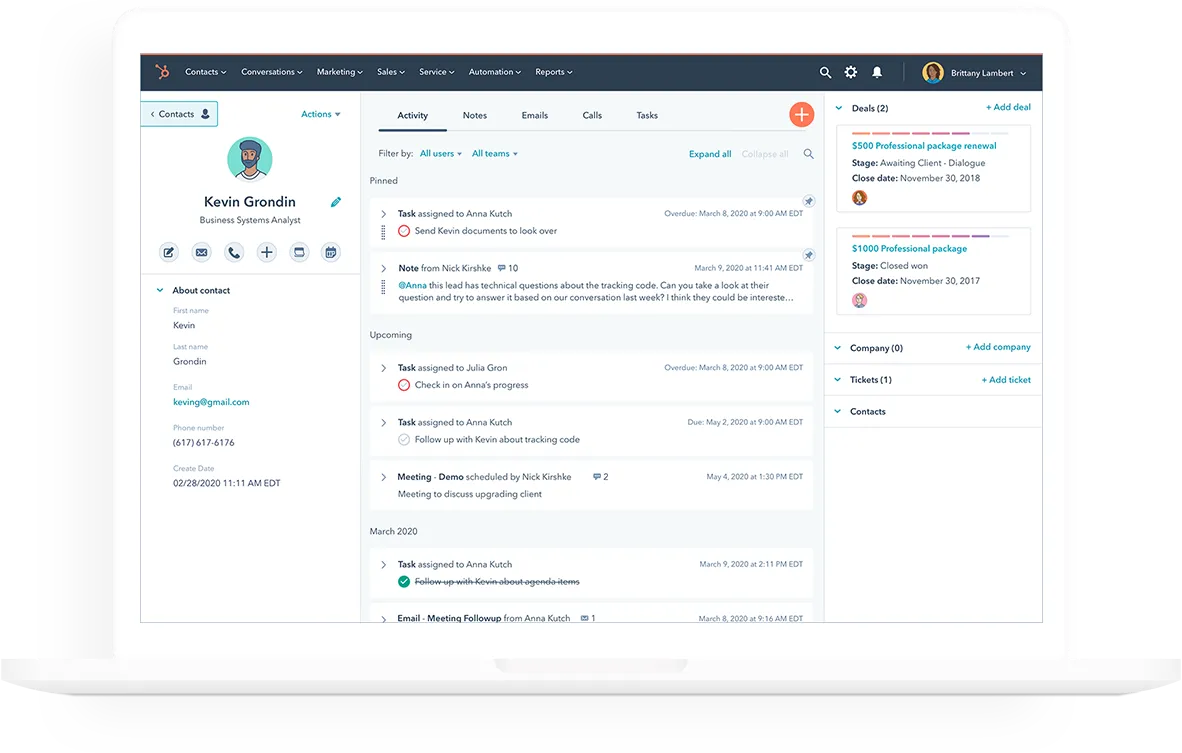
HubSpot
Although primarily positioned as an inbound marketing software, HubSpot has layered on robust ABM capabilities in recent years. The all-in-one CRM and marketing platform makes it easy for businesses to execute targeted account-based strategies.
Key Features
- Account scoring
- Personalized account-level email and landing page templates
- Multi-touch attribution reporting
- Integration with HubSpot CRM for transparency between marketing and sales
- HubSpot Meetings for customized sales plays and cadences
Ideal For
SMBs and mid-market companies adopting an account-based approach for the first time looking for an easy-to-use all-in-one platform.
What Users Love
HubSpot strikes an excellent balance between ease of use and depth of functionality. Users highlight the platform's intuitive UI and wealth of educational resources making it easy to pick up.
Potential Drawbacks
Reporting and analytics capabilities don't provide the granularity offered by other specialized ABM platforms. The ABM functionality, while full-featured, still feels like an add-on rather than the core focus.
Pricing
HubSpot's starter Marketing Hub plan starts at $45/month. Mid-market Pro and Enterprise pricing is custom quoted.
LeanData
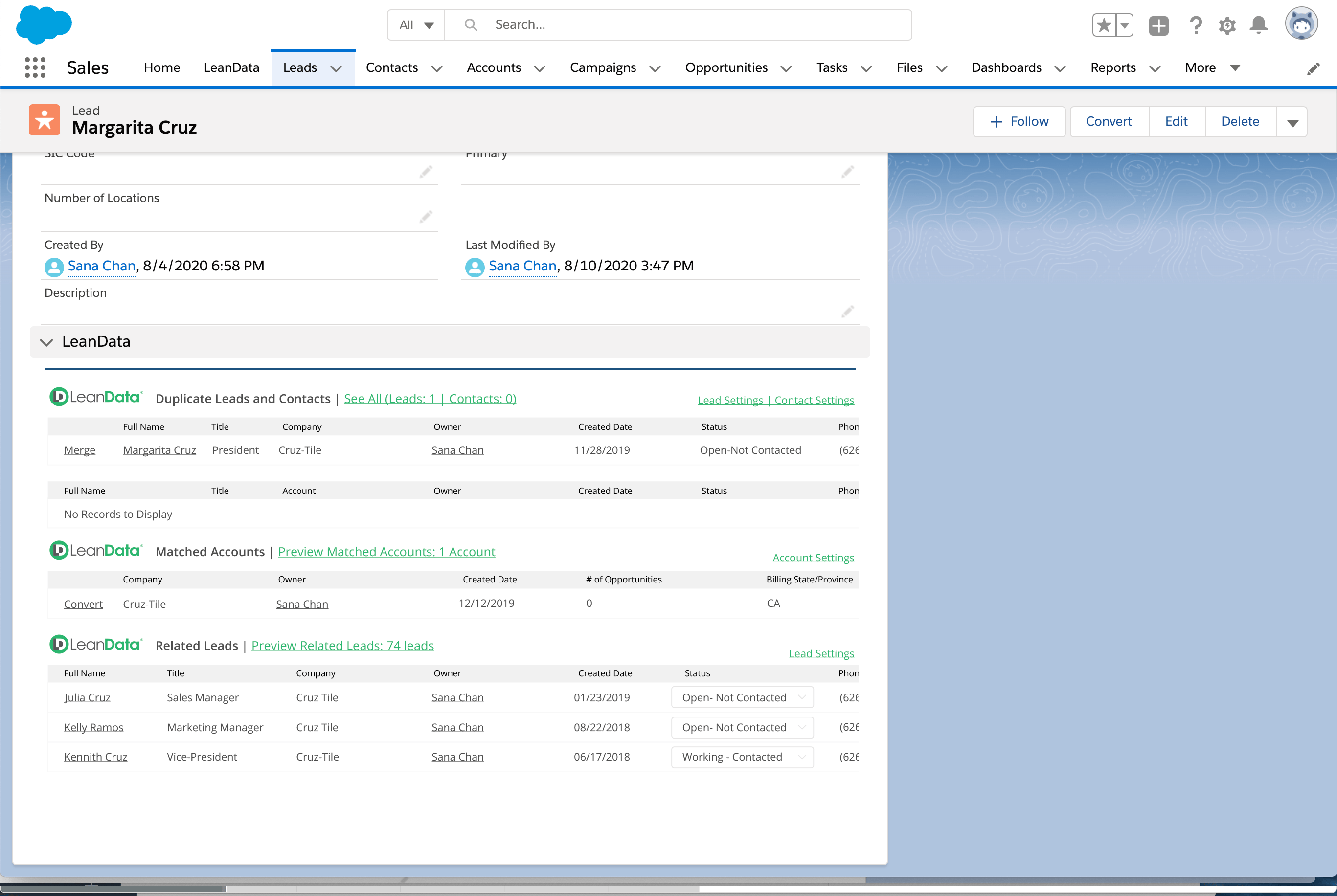
LeanData
Designed as a Salesforce add-on, LeanData equips Salesforce users with workflow automation and routing tools to facilitate an account-based approach. While not a standalone ABM solution, it's purpose-built to help Salesforce customers adopt account-based strategies.
Key Features
- Lead-to-account matching within Salesforce
- Intelligent lead assignment rules and routing capabilities
- Real-time Salesforce sync
- Customizable account-level dashboards
- Attribution reporting on account influence
Ideal For
Salesforce customers looking to level up their instance into an account-engagement platform without migrating away from Salesforce.
What Users Love
As a Salesforce native app, LeanData seamlessly plugs gaps within Salesforce helping users be more productive. Users highlight LeanData's flexibility, intuitive interface, and lead routing capabilities.
Potential Drawbacks
LeanData needs to be combined with other tools like marketing automation and predictive tools for a complete ABM stack. As Salesforce add-on, it also comes with a dependency on the Salesforce roadmap.
Pricing
LeanData starts at $1,500/month for the basic LeanData Lead offering. Salesforce Enterprise Edition pricing is custom quoted.
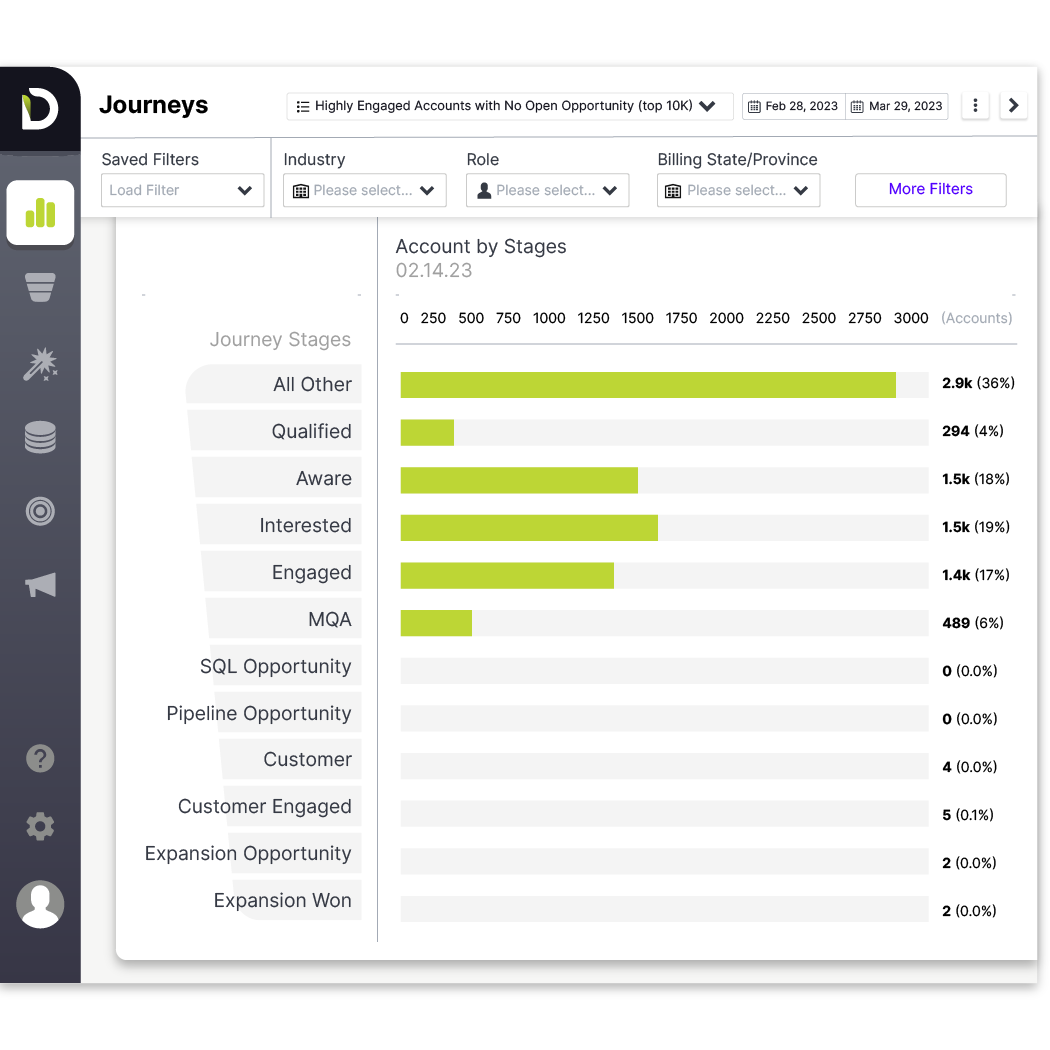
Demandbase One
Demandbase markets itself as the first AI-powered account-based platform built by account-based marketing pioneers. It combines targeting, engagement, and measurement tools natively developed for ABM.
Key Features
- Account selection frameworks identifying ideal customer profiles
- Multi-channel engagement tools for personalized outreach
- Account Journey Analytics measuring account progression
- Predictive recommendations based on account signals
- Native integrations with marketing & sales tools
Ideal For
Mid-market and enterprise companies looking for an end-to-end ABM platform purpose-built for targeted account strategies.
What Users Love
Users rate Demandbase's account intelligence capabilities and measurement tools allowing granular tracking of account engagement across channels. The platform also provides actionable recommendations on influencing targeted accounts.
Potential Drawbacks
Early reviews suggest Demandbase's UI leaves room for improvement in terms of intuitiveness and ease of use compared to more established players.
Pricing
Demandbase has three pricing tiers starting at $3,000/month for the Essentials plan. Enterprise pricing not publicly listed and provided upon request.
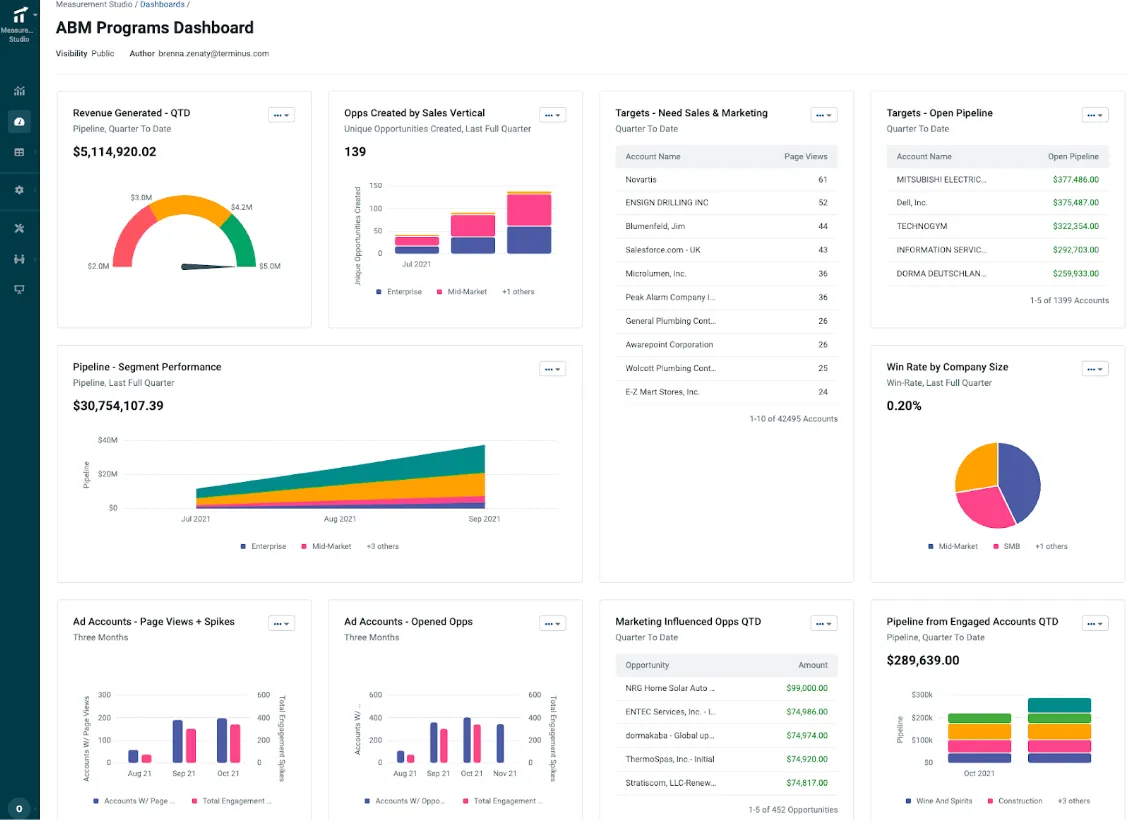
Terminus
Part of the new breed of startups focusing specifically on ABM, Terminus bills itself as the first account-based marketing platform built from the ground up. The platform aims to address common ABM pain points around orchestrating personalized campaigns across channels.
Key Features
- Account selection based on firmographic and technographic signals
- Integrated ad retargeting capabilities
- Dynamic website personalization for targeted accounts
- Native integration with marketing automation platforms
- Custom reporting dashboards aligning sales and marketing
Ideal For
Mid-market and enterprise companies looking for an end-to-end orchestration hub for executing targeted account strategies across paid, owned, and earned channels.
What Users Love
Early adopters praise Terminus for providing a centralized ABM command center allowing efficient coordination of campaigns and easy collaboration between teams. Users also highlight Terminus' speed in terms of campaign launch times and fast data processing.
Potential Drawbacks
As one of the newer players in the space, Terminus still has room to expand its partner and integration ecosystem compared to incumbents like Marketo.
Pricing
Terminus offers custom enterprise pricing starting at $5,500/month. Exact pricing not publicly listed.
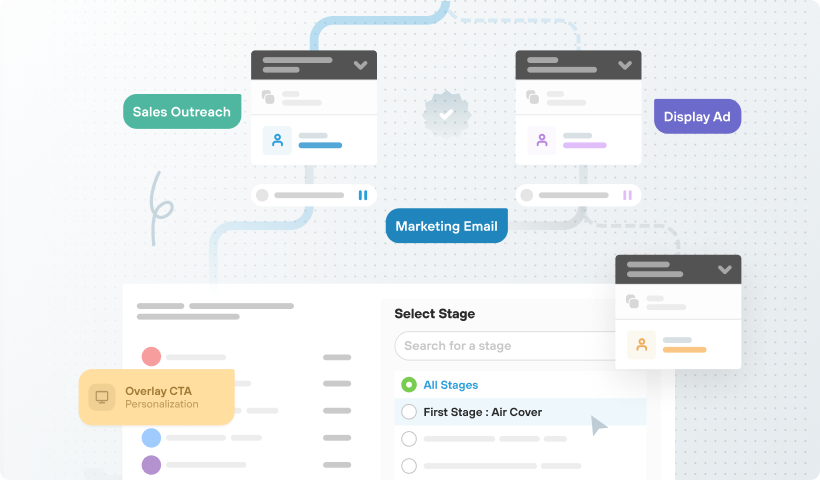
Triblio
Triblio merges ad targeting, web personalization, and sales activation tools into a single end-to-end account-based platform. Triblio differentiates itself by coordinating both outbound marketing campaigns and sales outreach timed against buyer signals.
Key Features
- Multi-channel account-based ad campaigns
- Dynamic web page personalization
- Integrated sales triggers based on account engagement
- Custom account scoring frameworks
- Cross-channel account-based reporting
Ideal For
Mid-market and enterprise companies looking for tight coordination between sales activation and orchestration of multi-channel ABM campaigns.
What Users Love
Users give Triblio top marks for flexibility to customize campaigns tailored to account needs across channels and seamlessly sync sales outreach. This eliminates silos and helps sales and marketing work as an extension of one another.
Potential Drawbacks
Some early reviews indicate Triblio's broad focus across advertising, web, and sales lacks depth compared to more specialized ABM solutions focused distinctly on either sales or marketing.
Pricing
Triblio account-based packages start at $4,000/month. Enterprise pricing not publicly listed.
| Software | Features | Ease of Use | Scalability | Integrations |
|---|---|---|---|---|
| Marketo | ⭐⭐⭐⭐⭐ | ⭐⭐⭐ | ⭐⭐⭐⭐⭐ | ⭐⭐⭐⭐ |
| HubSpot | ⭐⭐⭐⭐ | ⭐⭐⭐⭐ | ⭐⭐⭐ | ⭐⭐⭐ |
| LeanData | ⭐⭐⭐ | ⭐⭐ | ⭐⭐ | ⭐⭐⭐⭐ |
| Terminus | ⭐⭐⭐⭐ | ⭐⭐⭐ | ⭐⭐⭐⭐ | ⭐⭐⭐ |
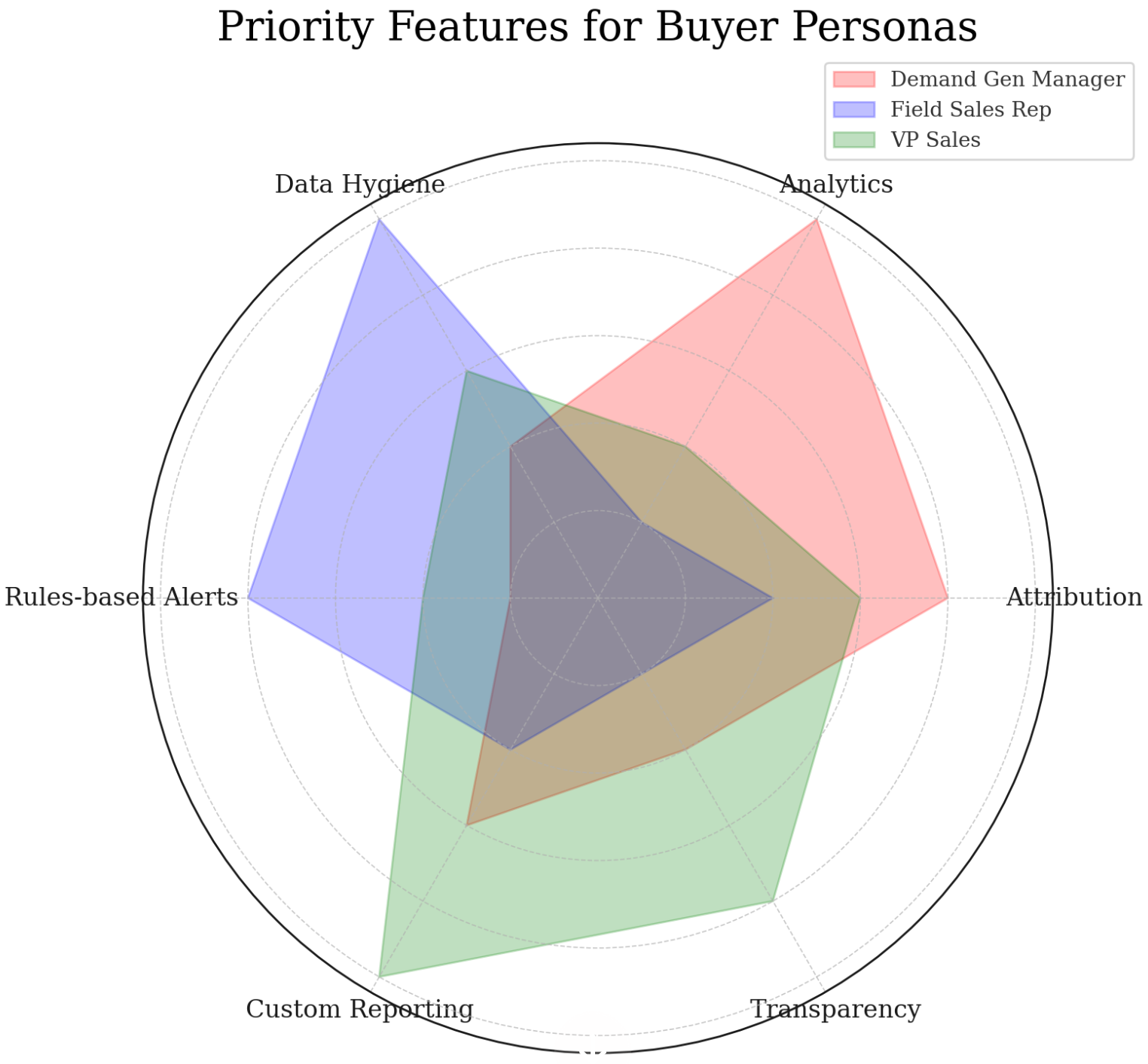
Other ABM Software Worth Exploring
While the platforms above represent top-tier ABM solutions suited for enterprise needs, a number of other tools deserve an honorable mention:
Close
A slick sales engagement platform with built-in voice and email sequencing loved by sales development reps looking to take an account-based approach.
Clearbit
Lead generation and enrichment tool for identifying and qualifying accounts matching your ideal customer profile.
Both solutions nicely complement primary ABM platforms focused on marketing execution and measurement.
Key Takeaways - Choosing the Right ABM Software
When evaluating your options, consider which features are most relevant for your use case. Here are some key criteria to help narrow down your options:
Company Size - Some vendors cater more to enterprise needs while others design primarily for small business.
Level of Complexity - Assess whether you need a sophisticated platform or easy-to-use all-in-one toolkit.
Marketing Focus vs Sales Focus - Certain platforms concentrate more on campaign orchestration while others focus on sales triggers and cadences.
Integrations - If leveraging other martech/sales tools, review what native integrations are available.
Budget - Prices can range from as little as $50/month to over $10K so set realistic expectations.
While the ABM software landscape has many strong contenders, for most, Marketo and Terminus strike the right balance of brand credibility, core functionality, and enterprise-readiness. For mid-market brands, HubSpot merits strong consideration based on usability and all-in-one go-to-market platform.
No matter which solution you end up choosing, implementing the right ABM technology provides the foundation for driving success through precise, highly personalized account-based go-to-market strategies.
So stop wasting effort on unqualified leads and instead empower your team to develop quality engagements with accounts that truly matter. Adopting an intelligent ABM platform today can help your business win more loyal enterprise customers tomorrow.
FAQ
What are the main benefits of account-based marketing (ABM)?
The main benefits of an ABM approach include increased relevance amongst your best-fit accounts, accelerated sales cycles through hyper-targeted outreach, and bigger deal sizes by focusing budget on high-value accounts likely to buy. Well-executed ABM also fosters better alignment between sales and marketing teams focused on shared accounts versus mismatched priorities.
What types of companies benefit most from adopting account-based marketing strategies?
ABM approaches work well for B2B companies selling complex, high-priced offerings into longer enterprise sales cycles where multiple stakeholders are involved in purchase decisions. The more considered the purchase, the greater the need for personalized outreach. Companies selling to named accounts vs random leads see faster sales cycles from ABM personalization. Businesses overloaded with leads lacking sales-readiness also benefit from ABM by focusing efforts only on qualified accounts.
How do you get started with account-based marketing plans and programs?
Getting started with ABM requires cross-functional collaboration between sales and marketing leadership teams. Begin by aligning on a targeted list of tier one accounts likely to buy that will become the focus of coordinated sales and marketing efforts. Build concise ICP and buyer persona profiles encapsulating your ideal customers. Audit existing data and content assets to identify gaps that need to be filled to attract and engage these accounts. Develop a 90-day ABM pilot plan, outlining coordinated sales and marketing activities per account before executing in order to test and refine your approach.
What are some common components of an effective account-based marketing technology stack?
Orchestrating account-based programs requires specialized technology beyond traditional CRM and marketing automation systems designed for mass lead generation. Common components of an ABM martech stack include account data enrichment tools, predictive lead and account scoring, customer data platforms, account-based advertising and web personalization tools, multi-touch attribution, and more. Integrating an ABM platform hub to consolidate cross-channel programs and reporting is key for synchronization. CRMs like Salesforce and Marketo provide robust foundations to build upon.
How do you measure success and outcomes from account-based marketing programs?
ABM success should be measured both on hard revenue metrics and also pipeline velocity and health metrics. On the hard money side, track deal rates, average contract values, and sales cycle length reductions in targeted accounts. Soft metrics like sales qualified lead increases, sales conversations generated, and marketing sourced pipeline creation matter. Elsewhere, account engagement rates, web visits from target accounts, content consumption and email open metrics indicate interest levels. Multi-touch attribution models help quantify marketing's influence alongside sales interactions tied back to revenue influence.
How much does account-based marketing software cost for most businesses?
ABM software costs can vary widely from around $1K per month for basic tools optimized for small businesses up to over $10K+ for enterprise platforms. Mid-market ABM tech runs from $2K to $5K on average. Many vendors customize pricing tiers based on number of accounts, users, and features required. Assess expected ROI potential before making major ABM software investments to ensure budget alignment.
Should you build an in-house homegrown ABM stack or buy commercial software solutions?
Unless you are a very sophisticated enterprise business with deep engineering resources, commercial ABM software solutions tend to provide better time to value compared to homegrown tools. The depth of data integrations and AI/ML predictive capabilities in modern ABM tech exceeds most IT teams’ ability to build themselves. Leverage commercial software for heavy lifting like targeting and personalization, while focusing engineering resources only on proprietary custom experiences and apps delivering unique value aligned to sales motions.
What mistakes commonly trip up first-time ABM programs?
Overinvesting prematurely without proper testing and controls or lack of executive buy-in are common first timer mistakes. Trying to take an overly broad approach without true personalization hampers results as does lack of sales and marketing collaboration on shared accounts. Moving too quickly from pilot stage without iterating, failing to invest adequately in content for niche accounts, and forgetting supporting operations like contracting processes also causes issues.
How can you expand ABM programs beyond marketing to companywide strategies?
Evolving ABM into a sustainable company-wide go-to-market engine requires planning. Embed ABM certified sales development reps into campaigns for persistent nurturing. Create playbooks for customer success to drive account renewals and expansions. Build alliances between partner managers and marketers to coordinate targeting on joint accounts. Enable analysts relations to focus on influencing key accounts. Develop executive briefing programs for C-suite contacts. Infuse all go-to-market motions with coordinated account intelligence.
What does the future look like for account-based marketing approaches?
The account-based wave will continue rising as B2B buyers demand 1:1 sales and marketing relationships, increasing technology accuracy, and thinning sales resources necessitating account focus. ABM shifts from siloed campaigns towards integrated strategies binding entire customer journeys across account lifecycles. Advancements in data and analytics will drive hyper-segmentation reaching named stakeholders. The proliferation of channels and touchpoints will increase technology consolidation into intelligence hubs. ultimately, ABM evolves account engagement from random art towards scientific growth engine.



